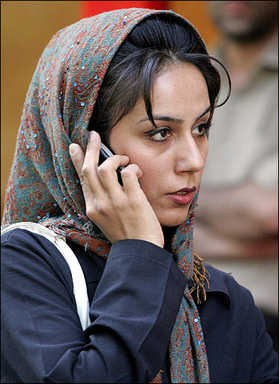
Dynamics

|
Generational Dynamics |
| Forecasting America's Destiny ... and the World's | |
| HOME WEB LOG COUNTRY WIKI COMMENT FORUM DOWNLOADS ABOUT | |
Under-30 voters may propel Mir-Hossein Mousavi to victory.
From the point of view of Generational Dynamics, Iran is almost exactly at the same point on the generational timeline as America was during the 1967 Summer of Love.
So it's not surprising that Iran's presidential election campaign, with voting to take place on Friday, resembles the same kind of generational split that occurred in America in 1968, when college students and other young protesters drove President Lyndon Johnson from office.
The campaigning became electrifying last week, thanks to a raucous televised debate on Wednesday between the two principal candidates, hard-liner incumbent Mahmoud Ahmadinejad and reformist candidate Mir-Hossein Mousavi.
The two candidates refused to look at one another during the debate, and made personal attacks on each other.
 |
The debate was so vicious that the Supreme Leader of the Islamic Revolution Ayatollah Seyyed Ali Khamenei issued a statement saying that presidential debates should remain within religious framework.
The consensus seems to be that Mousavi won the debate, mainly because of Ahmadinejad's behavior. He was extremely sarcastic and sneering, and his facial expressions were contemptous and condescending when Mousavi was speaking. Furthermore, he attacked Mousavi's wife, accusing her of corruption, and that attack appears to have turned people away from Ahmadinejad.
As I've described many times, Iran is a schizophrenic nation. Ahmadinejad represents the older generation of survivors of the last crisis war, the Great Islamic Revolution of 1979 and the subsequent Iran/Iraq war. He's been very hardline Islamist and anti-American, arresting women for wearing their head scarfs back and going around the world talking about wiping Israel off the map and denying the Holocaust.
People in younger Prophet generation (like our Boomers) are quite different -- generally pro-American and pro-Western, and not particularly anti-Israeli, although they don't like American forces in Iraq.
Mousavi is also a survivor of the 1979 revolution, but he's adopted the views of the young Prophet generation, and is very popular with them.
Thus, there's actually a possibility that Mousavi will win the election this week, much to everyone's surprise.
This is far from certain though, because the Ahmadinejad administration is very corrupt, and Ahmadinejad has been buying votes.
Those opposed to Ahmadinejad frequently claim that he has harmed Iran internationally with his vicious anti-Americanism, his open threats against Israel, and his confrontational policies about nuclear power.
At the debate last week, Mousavi attacked Ahmadinejad's foreign policy:
Our head of state made a trip to America... Sorry, to Iraq. Without any evidence of where and when, he said that there had been an attempt to kidnap him. This [behavior] makes us pay a price. It was the Americans who supposedly tried to kidnap you - the same Americans who supplied the fuel for our governmental plane in Iraq. Are we supposed to expand our imagination in foreign policy to things that pertain to our national interests? Does this resolve our problems, or does it create new ones, making us pay a steep price? ...
We have been told many times: 'We believe America is being defeated and is on its way to demise.' If that is the case, why did you travel there four times and write them two letters? ...
With regard to the Holocaust - we raised this issue, and again, we were harmed by this. The U.N. General Assembly passed a resolution which made it a crime to talk about the Holocaust, and we were also [condemned] by the Security Council. What happened recently in Switzerland - if I hadn't seen it on TV - I wouldn't have believed how much our president could be affronted. Our president represents our people and our country. He should not be pleased about what happened."
Mousavi himself is a former President, having served from 1980-88, after the Islamic Revolution and during the Iran/Iraq war. After defending his foreign policy, Ahmadinejad attacked Mousavi and also attacked his wife:
"Mr. Mousavi, many executives during your term and that of Mr. Hashemi came empty-handed and became billionaires with their import and export franchises." ...
Mr. Mousavi, I like you, but what kind of fundraising is this? Where is this coming from? Let me give you just one example: Rasht Electric. It was given without any tender to friends of [former mayor of Tehran] Mr. Karbaschi, to his wife, and to the wife of Mr. Ghobbeh. They tore down the factory in order to sell the land. There are dozens of similar cases. ...
Lawlessness is prevalent among the sons of some of the people who support you today. How did the son of Mr. Nategh [Nouri] become a billionaire? What kind of lifestyle does Mr. Nategh himself lead? These are your supporters. ...
 |
I have a file on a certain woman [[referring to Mousavi's wife]]. You know her. She sits next to you in your campaign broadcasts. In violation of all the country's laws, she studied toward two M.A. degrees when she was a [government] employee. One of them was at Azad University. She received her Ph.D. without having sat any entrance exams. Then she became an assistant professor in an unrelated field. She became president of a university without meeting the necessary requirements. This is lawlessness."
Following this debate, Mousavi's wife campaigned with him, acerbically attacking Ahmadinejad and demanding rights for women.
This kind of acrimony, while typical of any country's Awakening era, is new to Iran since the Islamic revolution. The acrimony has only grown in the last few days, as the campaign has continued to heat up, with charges and counter-charges.
In a speech in Tehran Wednesday, Ahmadinejad said his rivals had broken laws against insulting the president and they could face jail: "Such insults and accusations against the government are a return to Hitler's methods, to repeat lies and accusations until everyone believes those lies."
Anti-Ahmadinejad student demonstrations have been growing in Tehran, with demonstrators carrying green flags, the color of hope in Iran.
However, Ahmadinejad's supporters see a much more sinister intent: "Using a specific color for the first time by a candidate in this election shows the start of a velvet revolution project."
This is a very interesting phrase, and it refers to the 1989 Velvet Revolution which saw the peaceful overthrow of the Communist regime. In other words, Mousavi's supporters are being accused of wishing to overthrow the Islamic revolutionary government.
From the point of view of Generational Dynamics, this could actually happen. A "velvet revolution" is the kind of thing that represents an Awakening era climax, where the young Prophet generation achieves a political victory over the older generation that survived the crisis war. The forced resignation of President Nixon in 1974 is an example of an Awakening era climax in America.
Just as "women's lib" was important in America's 1960s, women's issues are playing a big role in Iran's election today, especially after Ahmadinejad attacked Mousavi's wife last week.
 |
For years I've been mocking Ahmadinejad's "morality police," who swoop down on women with loose headscarves, and carry them off the police station. Ahmadinejad has managed to piss off practically every young woman in Tehran.
However, according to a BBC report on Wednesday, Ahmadinejad has called off the morality police as election day approaches. The result is that young women are wearing much more explicit clothing, exposing their figures and hair.
In America's 1960s, young women shocked their parents by outdoing one another wearing short skirts and hot pants. A similar thing is happening today in Tehran, where young women are outdoing one another covering up less and less of their hair, and exposing their ankles. This always remindes me of the lyrics from the song "At the Big Check Apron Ball" from the Broadway show "New Girl In Town":
Oh, in these modern days
When ladies show their ankles
What's there to keep a poor lad, poor lad,
From going sim-puh-ly mad?
Whoever wins Friday's voting will not necessarily become President. There are four candidates in the race, and if none of them gets a majority vote, then there'll be a runoff election between the two leading candidates, probably Ahmadinejad and Mousavi.
But as we know from America's 1960s, this generational battle is not going to die off after the election. The acrimony will continue no matter who wins. If Mousavi wins, then he may well suffer the same kind of hostile political climate that President Richard Nixon faced after winning the 1968 election.
Those who are familiar with the "long hot summers," the massive street demonstrations and the student revolts that occurred in America in the 1960s and early 1970s know that we can expect a great deal of similar political tumult in Iran, no matter who wins the election.
(Comments: For reader comments, questions and discussion,
see the Iran thread of the Generational Dynamics forum.)
(11-Jun-2009)
Permanent Link
Receive daily World View columns by e-mail
Donate to Generational Dynamics via PayPal
Web Log Summary - 2016
Web Log Summary - 2015
Web Log Summary - 2014
Web Log Summary - 2013
Web Log Summary - 2012
Web Log Summary - 2011
Web Log Summary - 2010
Web Log Summary - 2009
Web Log Summary - 2008
Web Log Summary - 2007
Web Log Summary - 2006
Web Log Summary - 2005
Web Log Summary - 2004
Web Log - December, 2016
Web Log - November, 2016
Web Log - October, 2016
Web Log - September, 2016
Web Log - August, 2016
Web Log - July, 2016
Web Log - June, 2016
Web Log - May, 2016
Web Log - April, 2016
Web Log - March, 2016
Web Log - February, 2016
Web Log - January, 2016
Web Log - December, 2015
Web Log - November, 2015
Web Log - October, 2015
Web Log - September, 2015
Web Log - August, 2015
Web Log - July, 2015
Web Log - June, 2015
Web Log - May, 2015
Web Log - April, 2015
Web Log - March, 2015
Web Log - February, 2015
Web Log - January, 2015
Web Log - December, 2014
Web Log - November, 2014
Web Log - October, 2014
Web Log - September, 2014
Web Log - August, 2014
Web Log - July, 2014
Web Log - June, 2014
Web Log - May, 2014
Web Log - April, 2014
Web Log - March, 2014
Web Log - February, 2014
Web Log - January, 2014
Web Log - December, 2013
Web Log - November, 2013
Web Log - October, 2013
Web Log - September, 2013
Web Log - August, 2013
Web Log - July, 2013
Web Log - June, 2013
Web Log - May, 2013
Web Log - April, 2013
Web Log - March, 2013
Web Log - February, 2013
Web Log - January, 2013
Web Log - December, 2012
Web Log - November, 2012
Web Log - October, 2012
Web Log - September, 2012
Web Log - August, 2012
Web Log - July, 2012
Web Log - June, 2012
Web Log - May, 2012
Web Log - April, 2012
Web Log - March, 2012
Web Log - February, 2012
Web Log - January, 2012
Web Log - December, 2011
Web Log - November, 2011
Web Log - October, 2011
Web Log - September, 2011
Web Log - August, 2011
Web Log - July, 2011
Web Log - June, 2011
Web Log - May, 2011
Web Log - April, 2011
Web Log - March, 2011
Web Log - February, 2011
Web Log - January, 2011
Web Log - December, 2010
Web Log - November, 2010
Web Log - October, 2010
Web Log - September, 2010
Web Log - August, 2010
Web Log - July, 2010
Web Log - June, 2010
Web Log - May, 2010
Web Log - April, 2010
Web Log - March, 2010
Web Log - February, 2010
Web Log - January, 2010
Web Log - December, 2009
Web Log - November, 2009
Web Log - October, 2009
Web Log - September, 2009
Web Log - August, 2009
Web Log - July, 2009
Web Log - June, 2009
Web Log - May, 2009
Web Log - April, 2009
Web Log - March, 2009
Web Log - February, 2009
Web Log - January, 2009
Web Log - December, 2008
Web Log - November, 2008
Web Log - October, 2008
Web Log - September, 2008
Web Log - August, 2008
Web Log - July, 2008
Web Log - June, 2008
Web Log - May, 2008
Web Log - April, 2008
Web Log - March, 2008
Web Log - February, 2008
Web Log - January, 2008
Web Log - December, 2007
Web Log - November, 2007
Web Log - October, 2007
Web Log - September, 2007
Web Log - August, 2007
Web Log - July, 2007
Web Log - June, 2007
Web Log - May, 2007
Web Log - April, 2007
Web Log - March, 2007
Web Log - February, 2007
Web Log - January, 2007
Web Log - December, 2006
Web Log - November, 2006
Web Log - October, 2006
Web Log - September, 2006
Web Log - August, 2006
Web Log - July, 2006
Web Log - June, 2006
Web Log - May, 2006
Web Log - April, 2006
Web Log - March, 2006
Web Log - February, 2006
Web Log - January, 2006
Web Log - December, 2005
Web Log - November, 2005
Web Log - October, 2005
Web Log - September, 2005
Web Log - August, 2005
Web Log - July, 2005
Web Log - June, 2005
Web Log - May, 2005
Web Log - April, 2005
Web Log - March, 2005
Web Log - February, 2005
Web Log - January, 2005
Web Log - December, 2004
Web Log - November, 2004
Web Log - October, 2004
Web Log - September, 2004
Web Log - August, 2004
Web Log - July, 2004
Web Log - June, 2004